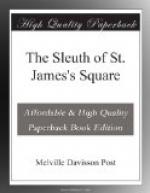“Well, Sir Henry,” he said, “the boys in the department think a good deal of me. I shouldn’t like them to know how a dirty tramp faked me at Atlantic City. I don’t mind telling you, but I couldn’t print it in a memoir.”
He went directly ahead with the story and I was careful not to interrupt him:
“I was sitting in a rolling chair out there on the Boardwalk before the Traymore. I was nearly all in, and I had taken a run to Atlantic for a day or two of the sea air. The fact is the whole department was down and out. You may remember what we were up against; it finally got into the newspapers.
“The government plates of the Third Liberty Bond issue had disappeared. We knew how they had gotten out, and we thought we knew the man at the head of the thing. It was a Mulehaus job, as we figured it.
“It was too big a thing for a little crook. With the government plates they could print Liberty Bonds just as the Treasury would. And they could sow the world with them.”
He paused and moved his gold-rimmed spectacles a little closer in on his nose.
“You see these war bonds are scattered all over the country. They are held by everybody. It’s not what it used to be, a banker’s business that we could round up. Nobody could round up the holders of these bonds.
“A big crook like Mulehaus could slip a hundred million of them into the country and never raise a ripple.”
He paused and drew his fingers across his bony protruding chin.
“I’ll say this for Mulehaus: He’s the hardest man to identify in the whole kingdom of crooks. Scotland Yard, the Service de la Surete, everybody, says that. I don’t mean dime-novel disguises - false whiskers and a limp. I mean the ability to be the character he pretends — the thing that used to make Joe Jefferson, Rip Van Winkle — and not an actor made up to look like him. That’s the reason nobody could keep track of Mulehaus, especially in South American cities. He was a French banker in the Egypt business and a Swiss banker in the Argentine.”
He turned back from the digression:
“And it was a clean job. They had got away with the plates. We didn’t have a clew. We thought, naturally, that they’d make for Mexico or some South American country to start their printing press. And we had the ports and border netted up. Nothing could have gone out across the border or, through any port. All the customs officers were, working with us, and every agent of the Department of Justice.”
He looked at me steadily across the table.
“You see the Government had to get those plates back before the crook started to print, or else take up every bond of that issue over the whole country. It was a hell of a thing!
“Of course we had gone right after the record of all the big crooks to see whose line this sort of job was. And the thing narrowed down to Mulehaus or old Vronsky. We soon found out it wasn’t Vronsky. He was in Joliet. It was Mulehaus. But we couldn’t find him.




